11 jan 2018

Israeli occupation forces killed 15 Palestinian children in the besieged Gaza Strip, the occupied West Bank and Jerusalem, in 2017, Defense for Children International-Palestine revealed on Tuesday.
The human rights organization said, in a report, that 12 children were shot dead, four of them during protests and three in ambushes setup by the army.
Meanwhile, Israeli occupation forces also killed five children during alleged attempts to carry out stabbing attacks.
The report pointed out, according to Days of Palestine, that a child was killed by artillery shelling in the Gaza Strip, and another by the explosion of a suspicious body while herding sheep near the city of Tubas in the northern West Bank while another died from injuries sustained in 2014.
The organization stressed that the Israeli army takes advantage of the lack of accountability to kill more children.
In related news, Israeli Minister of Agriculture Ori Ariel remarked, on Wednesday, that he had not heard any news about deaths under Israeli strikes in Gaza.
Speaking to Israeli general radio, the Israeli minister said that he wanted “qualitative” responses to alleged Palestinian rockets attacks.
“For months, I haven’t heard about news and wounded in Israeli airstrikes in the Gaza Strip,” he told the Israeli radio.
He wondered: “Which is the weapon we use when we strike the Gaza Strip that does not cause death and injuries among the Gazans?”
He continued: “When the Israeli forces trike Gaza, we only see smokes rising from the rubble of Palestinian houses and later on, no news about casualties.”
The human rights organization said, in a report, that 12 children were shot dead, four of them during protests and three in ambushes setup by the army.
Meanwhile, Israeli occupation forces also killed five children during alleged attempts to carry out stabbing attacks.
The report pointed out, according to Days of Palestine, that a child was killed by artillery shelling in the Gaza Strip, and another by the explosion of a suspicious body while herding sheep near the city of Tubas in the northern West Bank while another died from injuries sustained in 2014.
The organization stressed that the Israeli army takes advantage of the lack of accountability to kill more children.
In related news, Israeli Minister of Agriculture Ori Ariel remarked, on Wednesday, that he had not heard any news about deaths under Israeli strikes in Gaza.
Speaking to Israeli general radio, the Israeli minister said that he wanted “qualitative” responses to alleged Palestinian rockets attacks.
“For months, I haven’t heard about news and wounded in Israeli airstrikes in the Gaza Strip,” he told the Israeli radio.
He wondered: “Which is the weapon we use when we strike the Gaza Strip that does not cause death and injuries among the Gazans?”
He continued: “When the Israeli forces trike Gaza, we only see smokes rising from the rubble of Palestinian houses and later on, no news about casualties.”
9 jan 2018

The Israeli Occupation Forces (IOF) shot and killed over December eight unarmed Palestinian demonstrators, none of whom posed mortal danger, who were participating in protests near the Gaza perimeter fence, B’tselem’s new report revealed.
According to the report, Israeli troops fired live ammunition during protests against US recoginition of Jerusalem as capital of Israel, killing 10 Palestinians and injuring hundreds in West Bank, Gaza, and occupied Jerusalem.
In the Gaza demonstrations, the soldiers were located on the Israeli side of the fence, at some distance from the Palestinian protesters. They were undeniably not in mortal danger – certainly not of a kind that could not be prevented by other means, the report said.
Yet even this recent upsurge in the killing and injury of Palestinians through the unlawful and excessive use of live ammunition will not, most probably, be addressed any differently than thousands of other cases in which no one was held accountable.
The announcement of the launching of an investigation by the Military Police Investigation Unit into the killing of Ibrahim Abu Thuraya – released after the incident sparked headlines in Israel and around the world – holds no promise. It is no more than the first in a routine series of steps taken to whitewash the circumstances in which Israeli security forces kill Palestinians.
With the MAG Corps at the helm, the process will inevitably yield the familiar result: instead of being held to account, those responsible for these killings will be afforded protection.
According to the report, Israeli troops fired live ammunition during protests against US recoginition of Jerusalem as capital of Israel, killing 10 Palestinians and injuring hundreds in West Bank, Gaza, and occupied Jerusalem.
In the Gaza demonstrations, the soldiers were located on the Israeli side of the fence, at some distance from the Palestinian protesters. They were undeniably not in mortal danger – certainly not of a kind that could not be prevented by other means, the report said.
Yet even this recent upsurge in the killing and injury of Palestinians through the unlawful and excessive use of live ammunition will not, most probably, be addressed any differently than thousands of other cases in which no one was held accountable.
The announcement of the launching of an investigation by the Military Police Investigation Unit into the killing of Ibrahim Abu Thuraya – released after the incident sparked headlines in Israel and around the world – holds no promise. It is no more than the first in a routine series of steps taken to whitewash the circumstances in which Israeli security forces kill Palestinians.
With the MAG Corps at the helm, the process will inevitably yield the familiar result: instead of being held to account, those responsible for these killings will be afforded protection.
6 jan 2018

Some 19 Palestinians including 15 from the Gaza Strip and 4 from the West Bank have been killed and 3200 others were injured by Israeli Occupation Forces (IOF) since the US recognition of Jerusalem as the capital of Israel.
On the other hand, 56 Israelis were injured in clashes between Palestinian youths and Israeli police and IOF soldiers in protest at the US decision.
According to a report by Hurriya news, 1236 resistance actions were documented including 247 anti-occupation attacks by throwing stones, 82 by Molotov cocktails, 4 shooting attacks, 14 bombs, 3 stabbing attacks and 5 stabbing attempts. While in Gaza Strip, 16 rockets were fired towards 1948 Occupied Palestine.
Moreover, clashes took place in 1160 flash points including 697 in the West Bank, 113 in Gaza Strip and 5 in 1948 Occupied Palestine.
On the other hand, 56 Israelis were injured in clashes between Palestinian youths and Israeli police and IOF soldiers in protest at the US decision.
According to a report by Hurriya news, 1236 resistance actions were documented including 247 anti-occupation attacks by throwing stones, 82 by Molotov cocktails, 4 shooting attacks, 14 bombs, 3 stabbing attacks and 5 stabbing attempts. While in Gaza Strip, 16 rockets were fired towards 1948 Occupied Palestine.
Moreover, clashes took place in 1160 flash points including 697 in the West Bank, 113 in Gaza Strip and 5 in 1948 Occupied Palestine.
5 jan 2018
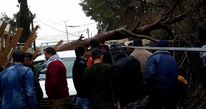
The committee of Palestinian political prisoners families in the West Bank said that Palestinian Authority (PA) security forces committed 4071 violations against Palestinians during the year of 2017.
The arrests were carried out against activists for their political backgrounds and involving in anti-occupation activities either in the field or on social media.
The committee documented, in a report, 1255 political arrests including 680 ex-prisoners, 738 political ex-detainees in PA jails, 242 university students, 45 journalists, 27 teachers, 12 school students, 7 physicians, 5 lawyers, 5 tradesmen, 5 engineers, 11 imams, and 1 university lecturer.
The violations also included 1608 summonses against 975 ex-detainees in PA jails, 749 ex-prisoners in Israeli jails, 183 students, 67 journalists, 34 teachers, 14 school students, 8 physicians, 3 lawyers, 2 tradesmen and 1 engineer.
The arrests were carried out against activists for their political backgrounds and involving in anti-occupation activities either in the field or on social media.
The committee documented, in a report, 1255 political arrests including 680 ex-prisoners, 738 political ex-detainees in PA jails, 242 university students, 45 journalists, 27 teachers, 12 school students, 7 physicians, 5 lawyers, 5 tradesmen, 5 engineers, 11 imams, and 1 university lecturer.
The violations also included 1608 summonses against 975 ex-detainees in PA jails, 749 ex-prisoners in Israeli jails, 183 students, 67 journalists, 34 teachers, 14 school students, 8 physicians, 3 lawyers, 2 tradesmen and 1 engineer.
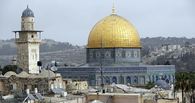
A number of Palestinian and Arab TV channels have decided to launch a joint broadcast on Saturday as part of a media campaign to support Jerusalem a month after the US president Donald Trump's recognition of the holy city as Israel's capital.
Different issues related to Jerusalem and the repercussions of the US decision will be discussed in the campaign which will coincide with another campaign on social media platforms under the hashtag "Jerusalem is the capital of Palestine".
The campaign followed calls by many Palestinian factions to launch protests in all Palestinian territories on Friday and Saturday against the US decision announced a month ago.
Different issues related to Jerusalem and the repercussions of the US decision will be discussed in the campaign which will coincide with another campaign on social media platforms under the hashtag "Jerusalem is the capital of Palestine".
The campaign followed calls by many Palestinian factions to launch protests in all Palestinian territories on Friday and Saturday against the US decision announced a month ago.
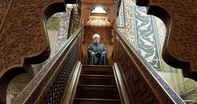
Al-Aqsa Mosque preacher, Sheikh Mohammed Husein, on Friday condemned the decisions made recently by the Israeli occupation and the US on Jerusalem and said they are null and void.
Sheikh Husein stressed that the Israeli unjust laws passed lately fall in line with Israel's attempts to legitimize its occupation of the Palestinian land and the crimes committed against the Palestinian people.
Husein slammed the Knesset's approval of a bill that allows imposing death penalty on Palestinian prisoners and described it as "racist par excellence".
He also criticized the Arab countries' procrastination in implementing the resolutions of the previous Arab summits and closing their embassies in all countries that plan to move their embassies in Israel to Jerusalem.
Thousands of Palestinian worshipers from Jerusalem and the 1948 occupied Palestine performed Friday prayer at al-Aqsa Mosque despite the cold weather, heavy rain, and tightened Israeli security measures.
Sheikh Husein stressed that the Israeli unjust laws passed lately fall in line with Israel's attempts to legitimize its occupation of the Palestinian land and the crimes committed against the Palestinian people.
Husein slammed the Knesset's approval of a bill that allows imposing death penalty on Palestinian prisoners and described it as "racist par excellence".
He also criticized the Arab countries' procrastination in implementing the resolutions of the previous Arab summits and closing their embassies in all countries that plan to move their embassies in Israel to Jerusalem.
Thousands of Palestinian worshipers from Jerusalem and the 1948 occupied Palestine performed Friday prayer at al-Aqsa Mosque despite the cold weather, heavy rain, and tightened Israeli security measures.
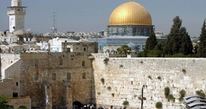
By Ramzy Baroud
The Israeli government is planning a series of measures aimed at fully denying Palestinians their legal rights in Jerusalem and precluding any future peace settlement based on sharing the city between Israel and a future Palestinian state.
One of the most aggressive measures to date is a bill that was approved by the Israeli Knesset on Tuesday, January 2.
The bill, which passed with the support of Israel’s ruling rightwing and far-right coalition has several dangerous stipulations.
According to the bill, two thirds of the Knesset majority is required for Israel to relinquish sovereignty over any part of Jerusalem. International law insists that Israel has no sovereignty over East Jerusalem, illegally occupied and annexed in 1967 and 1980 respectively.
An equally disturbing stipulation in the bill is that it removes two Palestinian neighborhoods from the municipal jurisdiction of the city.
The two affected neighborhoods are Kufr Aqab and the Shufat refugee camp.
By doing so, the Israeli government would have achieved another milestone in its demographic war on Palestinians.
It is important to note that the two Palestinian areas are located on the other side of what Israel refers to as the ‘Separation Wall’.
This move confirms the assumption that the Wall was built around Palestinians areas that Israel plans to annex in the future.
Now, that the wall construction is at an advanced stage, the process of annexation seems to have begun.
But the latest bill – dubbed by Palestinians as the ‘race law’ for it aims at vacating Jerusalem from Palestinian Arabs and increasing the number of the city’s Jewish settlers – is a rewritten version of an earlier bill.
‘The Greater Jerusalem Law‘, which was poised to win a majority vote at the Knesset was only shelved temporarily.
The delayed bill called for expanding the municipal boundaries of Jerusalem to include major illegal Jewish settlements in the West Bank, including Ma’aleh Adumim and the Gush Etzion settlement cluster.
Moreover, it endeavored to bring 150,000 Jewish settlers into Jerusalem as eligible voters, who would naturally tip the political scene more to the right.
Concurrently, the law would further demote the status of 100,000 Palestinians, who would find themselves in a politically gray area.
That bill was cast aside only weeks before the United States government agreed to move the US Embassy from Tel Aviv to Jerusalem.
While many in the international community were focused on what the American move would mean for the future of the region and the so-called peace process, few paid heed to the fact that the US and Israel had something far more consequential in mind.
News agencies at the time reported that Israel agreed to shelf a popular bill “under US pressure.” But that ‘pressure’ only aimed at giving President Donald Trump the needed time to formulate his own strategy and make the troubling announcement.
Since then, many Palestinians were killed, hundreds wounded and more detained as Palestinians and their allies around the world displayed outrage by the US decision.
A symbolic but telling vote at the United Nations on December 21 showed that the US and Israel stood alone in their fight to deny Palestinians their rights in their unlawfully occupied city.
Wasting no time, Israeli lawmakers are now pushing forward with designs to further isolate Jerusalem and to empty it from its Palestinian inhabitants.
They understand that the unparalleled US support must be exploited to the maximum, and that any delay on these bills would certainly be missed opportunities.
The nature of the US-Israel coordination is indeed unprecedented. Just as the Knesset voted to approve the bill, the US moved quickly to cap any strong Palestinian reactions.
That job was entrusted to US Ambassador to the UN, Nikki Haley, who has gone further than any other US official in her attempt to intimidate, and even bully Palestinians.
Haley declared that the US will cut off US funding of the United Nations Relief and Works Agency (UNRWA) and will only resume funding when the Palestinians agree to return to the negotiations.
UNRWA is the main channel for support for Palestinians refugees. That decision will further tighten the noose on a struggling Palestinian economy and the Palestinian Authority which relies mostly on international aid to survive.
Haley, of course, understands that no Palestinian leadership can engage politically with Israel and the US when the two countries refuse to accept international law as a frame of reference in the negotiations.
Now, the Palestinian leadership has to choose between its existing humiliation or further humiliation.
But Haley’s threat is also aimed at changing the conversation, and taking the focus away from the racist Israeli bill that will surely lead to further annexation in Jerusalem itself and throughout the West Bank.
The US and Israel are now actively invested in a system of political Apartheid in Palestine, and are twisting the arm of the PA to facilitate such a dreadful regime.
PA officials have made many threats so far, including the exclusion of the US from the peace process and changing their demand to a one state solution.
But there is nothing concrete so far regarding that coveted Palestinian strategy; one that is predicated on a united Palestinian leadership that truly explores new options, allies and future outlook.
It is that lack of vision that compromises the Palestinian position even further, emboldening Israel to push forward with its racist laws and apartheid walls.
– Ramzy Baroud is a journalist, author and editor of Palestine Chronicle. Baroud has a Ph.D. in Palestine Studies from the University of Exeter and is a Non-Resident Scholar at Orfalea Center for Global and International Studies, University of California Santa Barbara.
The Israeli government is planning a series of measures aimed at fully denying Palestinians their legal rights in Jerusalem and precluding any future peace settlement based on sharing the city between Israel and a future Palestinian state.
One of the most aggressive measures to date is a bill that was approved by the Israeli Knesset on Tuesday, January 2.
The bill, which passed with the support of Israel’s ruling rightwing and far-right coalition has several dangerous stipulations.
According to the bill, two thirds of the Knesset majority is required for Israel to relinquish sovereignty over any part of Jerusalem. International law insists that Israel has no sovereignty over East Jerusalem, illegally occupied and annexed in 1967 and 1980 respectively.
An equally disturbing stipulation in the bill is that it removes two Palestinian neighborhoods from the municipal jurisdiction of the city.
The two affected neighborhoods are Kufr Aqab and the Shufat refugee camp.
By doing so, the Israeli government would have achieved another milestone in its demographic war on Palestinians.
It is important to note that the two Palestinian areas are located on the other side of what Israel refers to as the ‘Separation Wall’.
This move confirms the assumption that the Wall was built around Palestinians areas that Israel plans to annex in the future.
Now, that the wall construction is at an advanced stage, the process of annexation seems to have begun.
But the latest bill – dubbed by Palestinians as the ‘race law’ for it aims at vacating Jerusalem from Palestinian Arabs and increasing the number of the city’s Jewish settlers – is a rewritten version of an earlier bill.
‘The Greater Jerusalem Law‘, which was poised to win a majority vote at the Knesset was only shelved temporarily.
The delayed bill called for expanding the municipal boundaries of Jerusalem to include major illegal Jewish settlements in the West Bank, including Ma’aleh Adumim and the Gush Etzion settlement cluster.
Moreover, it endeavored to bring 150,000 Jewish settlers into Jerusalem as eligible voters, who would naturally tip the political scene more to the right.
Concurrently, the law would further demote the status of 100,000 Palestinians, who would find themselves in a politically gray area.
That bill was cast aside only weeks before the United States government agreed to move the US Embassy from Tel Aviv to Jerusalem.
While many in the international community were focused on what the American move would mean for the future of the region and the so-called peace process, few paid heed to the fact that the US and Israel had something far more consequential in mind.
News agencies at the time reported that Israel agreed to shelf a popular bill “under US pressure.” But that ‘pressure’ only aimed at giving President Donald Trump the needed time to formulate his own strategy and make the troubling announcement.
Since then, many Palestinians were killed, hundreds wounded and more detained as Palestinians and their allies around the world displayed outrage by the US decision.
A symbolic but telling vote at the United Nations on December 21 showed that the US and Israel stood alone in their fight to deny Palestinians their rights in their unlawfully occupied city.
Wasting no time, Israeli lawmakers are now pushing forward with designs to further isolate Jerusalem and to empty it from its Palestinian inhabitants.
They understand that the unparalleled US support must be exploited to the maximum, and that any delay on these bills would certainly be missed opportunities.
The nature of the US-Israel coordination is indeed unprecedented. Just as the Knesset voted to approve the bill, the US moved quickly to cap any strong Palestinian reactions.
That job was entrusted to US Ambassador to the UN, Nikki Haley, who has gone further than any other US official in her attempt to intimidate, and even bully Palestinians.
Haley declared that the US will cut off US funding of the United Nations Relief and Works Agency (UNRWA) and will only resume funding when the Palestinians agree to return to the negotiations.
UNRWA is the main channel for support for Palestinians refugees. That decision will further tighten the noose on a struggling Palestinian economy and the Palestinian Authority which relies mostly on international aid to survive.
Haley, of course, understands that no Palestinian leadership can engage politically with Israel and the US when the two countries refuse to accept international law as a frame of reference in the negotiations.
Now, the Palestinian leadership has to choose between its existing humiliation or further humiliation.
But Haley’s threat is also aimed at changing the conversation, and taking the focus away from the racist Israeli bill that will surely lead to further annexation in Jerusalem itself and throughout the West Bank.
The US and Israel are now actively invested in a system of political Apartheid in Palestine, and are twisting the arm of the PA to facilitate such a dreadful regime.
PA officials have made many threats so far, including the exclusion of the US from the peace process and changing their demand to a one state solution.
But there is nothing concrete so far regarding that coveted Palestinian strategy; one that is predicated on a united Palestinian leadership that truly explores new options, allies and future outlook.
It is that lack of vision that compromises the Palestinian position even further, emboldening Israel to push forward with its racist laws and apartheid walls.
– Ramzy Baroud is a journalist, author and editor of Palestine Chronicle. Baroud has a Ph.D. in Palestine Studies from the University of Exeter and is a Non-Resident Scholar at Orfalea Center for Global and International Studies, University of California Santa Barbara.
4 jan 2018
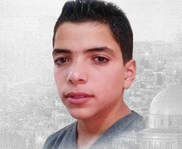
Musab al-Tamimi 17
A Palestinian youth on Thursday afternoon was seriously wounded by Israeli Occupation Forces (IOF) who shot him with a live bullet in the head during clashes that erupted in Deir Nitham town west of Ramallah after the funeral of the Palestinian martyr Musab al-Tamimi.
The injured Palestinian man was transferred to hospital as his injury was described as serious.
The head of the local council of Deir Nitham, Ahmad al-Tamimi, told WAFA news agency that IOF soldiers blocked the funeral of martyr al-Tamimi, assaulted the participants and showered them with tear gas canisters and stun grenades.
A Palestinian youth on Thursday afternoon was seriously wounded by Israeli Occupation Forces (IOF) who shot him with a live bullet in the head during clashes that erupted in Deir Nitham town west of Ramallah after the funeral of the Palestinian martyr Musab al-Tamimi.
The injured Palestinian man was transferred to hospital as his injury was described as serious.
The head of the local council of Deir Nitham, Ahmad al-Tamimi, told WAFA news agency that IOF soldiers blocked the funeral of martyr al-Tamimi, assaulted the participants and showered them with tear gas canisters and stun grenades.

A small piece of leather or cloth pouch with two lengths of cord on its both ends, the first is attached to one finger and the other is let go at a precise moment to hurl a stone at the target. Such homemade weapon has always been a prominent tool in Palestinian young men’s confrontations with Israeli soldiers in the occupied territories.
The sling or shepherd's sling, which is different from the Y-shaped slingshot, is a primitive weapon, but it satisfies the intifada (uprising) youths’ needs during their skirmishes with armed soldiers and allows them to throw stones much farther than they could do by hand.
As the “Jerusalem Freedom” intifada broke out recently in response to the US recognition of Occupied Jerusalem as Israel’s capital, the use of this tool regained momentum among the young people and helped them to sketch heroic scenes at flashpoints, where Israeli military posts and checkpoints are usually located.
The use of slings has never been limited to Palestinian young men. Several photos of girls on the internet also confirm they know how to use such weapon during clashes with Israeli soldiers.
A 20-year-old young man from Balata refugee camp told the Palestinian Information Center (PIC) that he is skilled in making slings using pliant pieces of leather that help stones go far distances.
He added that the use of slings also helps keep a distance between protesters and Israeli soldiers and reduce chances of their exposure to arrest.
For her part, a 19-year-old girl called Omaima said that the Palestinian young men always rely on popular primitive weapons such as stones and slings during their skirmishes with Israeli soldiers.
However, such simple weapons are means used by Palestinian protesters to confront Israel’s armed forces and to express rejection of the occupation of their land, Omaima affirmed.
Using stones by hand or other means like a sling has always been a source of disturbance to Israel. In 2015, the Knesset passed legislation imposing tough penalties and imprisonment on stone throwers.
A security cabinet meeting chaired by Israeli premier Benjamin Netanyahu also adopted a decision in September 2017 allowing soldiers to use deadly force against Palestinians throwing stones.
The sling or shepherd's sling, which is different from the Y-shaped slingshot, is a primitive weapon, but it satisfies the intifada (uprising) youths’ needs during their skirmishes with armed soldiers and allows them to throw stones much farther than they could do by hand.
As the “Jerusalem Freedom” intifada broke out recently in response to the US recognition of Occupied Jerusalem as Israel’s capital, the use of this tool regained momentum among the young people and helped them to sketch heroic scenes at flashpoints, where Israeli military posts and checkpoints are usually located.
The use of slings has never been limited to Palestinian young men. Several photos of girls on the internet also confirm they know how to use such weapon during clashes with Israeli soldiers.
A 20-year-old young man from Balata refugee camp told the Palestinian Information Center (PIC) that he is skilled in making slings using pliant pieces of leather that help stones go far distances.
He added that the use of slings also helps keep a distance between protesters and Israeli soldiers and reduce chances of their exposure to arrest.
For her part, a 19-year-old girl called Omaima said that the Palestinian young men always rely on popular primitive weapons such as stones and slings during their skirmishes with Israeli soldiers.
However, such simple weapons are means used by Palestinian protesters to confront Israel’s armed forces and to express rejection of the occupation of their land, Omaima affirmed.
Using stones by hand or other means like a sling has always been a source of disturbance to Israel. In 2015, the Knesset passed legislation imposing tough penalties and imprisonment on stone throwers.
A security cabinet meeting chaired by Israeli premier Benjamin Netanyahu also adopted a decision in September 2017 allowing soldiers to use deadly force against Palestinians throwing stones.
3 jan 2018
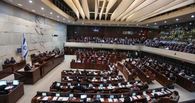
Israeli Knesset on Wednesday gave a preliminary approval for a bill allowing the death penalty against Palestinian attackers whose anti-occupation operations led to the death of Israeli soldiers and settlers.
Following a heated debate, the bill passed a preliminary reading. The new legislation is sponsored by the far-right party of Israel Our Home (Yisrael Beiteinu), which is part of Prime Minister Benjamin Netanyahu's coalition.
Under the bill, military and civil courts could sentence to death a person who was convicted of killing, with a simple majority. Israel's military law already allows the death penalty against Palestinian anti-occupation attackers but only in military court and if the entire judges in the panel reach the decision unanimously.
Israel's security system has not endorsed the new legislation as an assessment by the Shin Bet security apparatus said that such a penalty might have a counterproductive effect.
Following a heated debate, the bill passed a preliminary reading. The new legislation is sponsored by the far-right party of Israel Our Home (Yisrael Beiteinu), which is part of Prime Minister Benjamin Netanyahu's coalition.
Under the bill, military and civil courts could sentence to death a person who was convicted of killing, with a simple majority. Israel's military law already allows the death penalty against Palestinian anti-occupation attackers but only in military court and if the entire judges in the panel reach the decision unanimously.
Israel's security system has not endorsed the new legislation as an assessment by the Shin Bet security apparatus said that such a penalty might have a counterproductive effect.
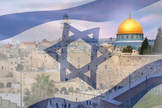
The Israeli Knesset approved, on Monday night, the second and third readings of the so-called United Jerusalem Bill, which takes occupied Jerusalem from any future deal with Palestinians.
Sources said, according to Days of Palestine, that 64 extremist Jewish MKs voted in favour of the bill, while 51 voted against it, including the Arabs, and one abstained.
The bill was proposed by the chairman of the extremist Jewish Home party and the Education Minister Naftali Bennett, and was submitted by MK Shuli Moalem-Refaeli.
It stipulates that a majority of 80 MKs will be required to change the status of Jerusalem or for any transfer of territories from Jerusalem within the framework of a future diplomatic agreement.
Previously, a majority of only 61 MKs was required.
Israeli Jerusalem Affairs Minister Ze’ev Elkin welcomed the approval of the bill. “I congratulate the Knesset on the approval by a large majority of the amendment to the Basic Law,” he said.
He wrote on Twitter: “Jerusalem, which strengthens the defensive wall against those on the left who may try to harm Israeli sovereignty in united Jerusalem in the future.”
Bennett, meanwhile, welcomed the approval and wrote on Facebook: “Just now we ensured that Jerusalem will be united forever. We initiated the law that guards Jerusalem so that it cannot be divided without a huge majority of 80 MKs.”
Zionist Jewish gangs occupied the Western part of Jerusalem 1948 along with most of Palestine’s area. In 1967, they occupied the Eastern part along with the West Bank, the Gaza Strip, the Syrian Golan Heights and the Egyptian Sinai Peninsula.
Challenging the international community, in 1980, Israel announced united Jerusalem as its capital, arousing a UN Security Council resolution calling any Israeli measure that changes the legal status of Jerusalem city is “null and void.”
However, on 6 December, 2017, the US President Donald Trump recognized united Jerusalem as the “eternal capital of the state of Israel” and announced plan to relocated the US embassy from Tel Aviv to Jerusalem.
Sources said, according to Days of Palestine, that 64 extremist Jewish MKs voted in favour of the bill, while 51 voted against it, including the Arabs, and one abstained.
The bill was proposed by the chairman of the extremist Jewish Home party and the Education Minister Naftali Bennett, and was submitted by MK Shuli Moalem-Refaeli.
It stipulates that a majority of 80 MKs will be required to change the status of Jerusalem or for any transfer of territories from Jerusalem within the framework of a future diplomatic agreement.
Previously, a majority of only 61 MKs was required.
Israeli Jerusalem Affairs Minister Ze’ev Elkin welcomed the approval of the bill. “I congratulate the Knesset on the approval by a large majority of the amendment to the Basic Law,” he said.
He wrote on Twitter: “Jerusalem, which strengthens the defensive wall against those on the left who may try to harm Israeli sovereignty in united Jerusalem in the future.”
Bennett, meanwhile, welcomed the approval and wrote on Facebook: “Just now we ensured that Jerusalem will be united forever. We initiated the law that guards Jerusalem so that it cannot be divided without a huge majority of 80 MKs.”
Zionist Jewish gangs occupied the Western part of Jerusalem 1948 along with most of Palestine’s area. In 1967, they occupied the Eastern part along with the West Bank, the Gaza Strip, the Syrian Golan Heights and the Egyptian Sinai Peninsula.
Challenging the international community, in 1980, Israel announced united Jerusalem as its capital, arousing a UN Security Council resolution calling any Israeli measure that changes the legal status of Jerusalem city is “null and void.”
However, on 6 December, 2017, the US President Donald Trump recognized united Jerusalem as the “eternal capital of the state of Israel” and announced plan to relocated the US embassy from Tel Aviv to Jerusalem.
2 jan 2018

Hebrew website "0404" on Tuesday reported that the US president Donald Trump has confirmed his plan to move his country's embassy in Israel from Tel Aviv to Jerusalem in 2018.
It added that Trump is pressuring the logistics staff in Washington, in coordination with the Israeli Prime Minister Benjamin Netanyahu, to start the transfer soon.
A source at the White House told the Hebrew website that Trump has sent a clear message to Israel that he wants to start the relocation as soon as possible.
The website, which is known for being close to the Israeli army, noted that the US embassy will be moved from Tel Aviv in the 1948 occupied Palestine to a diplomatic hotel in Occupied Jerusalem.
Israel occupied the eastern part of Jerusalem in 1967. In 1980 it declared its annexation to West Jerusalem which had been occupied since 1948 and announced Jerusalem the "eternal capital" of Israel, a move which the international community refuses to recognize.
On 6th December 2017 Trump recognized Occupied Jerusalem as the capital of Israel and announced his intention to move the US embassy in Israel to the holy city.
The Knesset on Monday approved the "unified Jerusalem" bill in the second and third readings with 61 votes in favor and 51 against. The bill stipulates that any decision related to relinquishing parts of Jerusalem will require the consent of 80 MKs.
It added that Trump is pressuring the logistics staff in Washington, in coordination with the Israeli Prime Minister Benjamin Netanyahu, to start the transfer soon.
A source at the White House told the Hebrew website that Trump has sent a clear message to Israel that he wants to start the relocation as soon as possible.
The website, which is known for being close to the Israeli army, noted that the US embassy will be moved from Tel Aviv in the 1948 occupied Palestine to a diplomatic hotel in Occupied Jerusalem.
Israel occupied the eastern part of Jerusalem in 1967. In 1980 it declared its annexation to West Jerusalem which had been occupied since 1948 and announced Jerusalem the "eternal capital" of Israel, a move which the international community refuses to recognize.
On 6th December 2017 Trump recognized Occupied Jerusalem as the capital of Israel and announced his intention to move the US embassy in Israel to the holy city.
The Knesset on Monday approved the "unified Jerusalem" bill in the second and third readings with 61 votes in favor and 51 against. The bill stipulates that any decision related to relinquishing parts of Jerusalem will require the consent of 80 MKs.
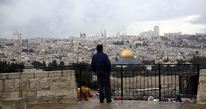
The "unified Jerusalem" bill which provides for separating Palestinian neighborhoods from Jerusalem and prohibits relinquishing any part of the city under any future agreement has passed its second and third readings at the Israeli Knesset.
Any decision relating to Jerusalem, the bill stipulated, will require the consent of 80 MKs—even in the case of a peace agreement.
64 MKs supported the bill and 51 objected. MK Ofer Shelah (Yesh Atid) ended up abstaining, despite his intention of voting against it.
The bill, filed by the Jewish Home party, requires the approval of 80 MKs for any decision to hand over parts of Jerusalem to the Palestinian Authority in the future.
The Ministerial Committee for Legislation ratified the bill several months ago, and it was amended later to settle differences of opinion in the government coalition.
Initiated by Israeli ministers Naftali Bennett and Ze'ev Elkin, the bill is aimed at preparing for future steps to cut off Palestinian neighborhoods from Jerusalem and establish a new Israeli local council for them. The project mainly targets Kafr Aqab and Shu'fat neighborhoods.
The "unified Jerusalem" bill was set to face a vote earlier but Israel's Prime Minister, Benjamin Netanyahu, had decided to postpone the vote following the U.S. president Donald Trump's recognition of Jerusalem as the capital of Israel.
Any decision relating to Jerusalem, the bill stipulated, will require the consent of 80 MKs—even in the case of a peace agreement.
64 MKs supported the bill and 51 objected. MK Ofer Shelah (Yesh Atid) ended up abstaining, despite his intention of voting against it.
The bill, filed by the Jewish Home party, requires the approval of 80 MKs for any decision to hand over parts of Jerusalem to the Palestinian Authority in the future.
The Ministerial Committee for Legislation ratified the bill several months ago, and it was amended later to settle differences of opinion in the government coalition.
Initiated by Israeli ministers Naftali Bennett and Ze'ev Elkin, the bill is aimed at preparing for future steps to cut off Palestinian neighborhoods from Jerusalem and establish a new Israeli local council for them. The project mainly targets Kafr Aqab and Shu'fat neighborhoods.
The "unified Jerusalem" bill was set to face a vote earlier but Israel's Prime Minister, Benjamin Netanyahu, had decided to postpone the vote following the U.S. president Donald Trump's recognition of Jerusalem as the capital of Israel.
1 jan 2018

Head of Jerusalem's Supreme Islamic Council, Sheikh Ekrima Sabri, on Sunday warned of the consequences of the US president Donald Trump's recognition of Jerusalem as Israel's capital.
During an event held in support of Jerusalem in al-Bi'na village in the northern 1948 occupied Palestine, Sabri stressed that if Israel attempted again to impose its sovereignty over al-Aqsa Mosque, the intifada would be more intense than the one that flared in July 2017 against the metal detectors installed at al-Aqsa gates.
"We are facing a great challenge, and this is an opportunity to unite to defend Jerusalem," Sheikh Sabri said, praising the Arab and European masses who have supported Jerusalem over the past period against the US move and calling for more protests to force Trump to backtrack on his decision.
During an event held in support of Jerusalem in al-Bi'na village in the northern 1948 occupied Palestine, Sabri stressed that if Israel attempted again to impose its sovereignty over al-Aqsa Mosque, the intifada would be more intense than the one that flared in July 2017 against the metal detectors installed at al-Aqsa gates.
"We are facing a great challenge, and this is an opportunity to unite to defend Jerusalem," Sheikh Sabri said, praising the Arab and European masses who have supported Jerusalem over the past period against the US move and calling for more protests to force Trump to backtrack on his decision.

The Knesset is set on Monday to vote on the "unified Jerusalem" bill which provides for separating Palestinian neighborhoods from Jerusalem and prohibits relinquishing any part of the city under any future agreement.
The bill, filed by the Jewish Home party, requires the approval of 80 MKs for any decision to hand over parts of Jerusalem to the Palestinian Authority in the future. The Ministerial Committee for Legislation ratified the bill several months ago, and it was amended later to settle differences of opinion in the government coalition.
Initiated by Israeli ministers Naftali Bennett and Ze'ev Elkin, the bill is aimed at preparing for future steps to cut off Palestinian neighborhoods from Jerusalem and establish a new Israeli local council for them. The project mainly targets Kafr Aqab and Shu'fat neighborhoods.
The "unified Jerusalem" bill was set to face a vote earlier but Israel's Prime Minister, Benjamin Netanyahu, had decided to postpone the vote following the US president Donald Trump's recognition of Jerusalem as the capital of Israel.
The bill, filed by the Jewish Home party, requires the approval of 80 MKs for any decision to hand over parts of Jerusalem to the Palestinian Authority in the future. The Ministerial Committee for Legislation ratified the bill several months ago, and it was amended later to settle differences of opinion in the government coalition.
Initiated by Israeli ministers Naftali Bennett and Ze'ev Elkin, the bill is aimed at preparing for future steps to cut off Palestinian neighborhoods from Jerusalem and establish a new Israeli local council for them. The project mainly targets Kafr Aqab and Shu'fat neighborhoods.
The "unified Jerusalem" bill was set to face a vote earlier but Israel's Prime Minister, Benjamin Netanyahu, had decided to postpone the vote following the US president Donald Trump's recognition of Jerusalem as the capital of Israel.
Page: 2 - 1
